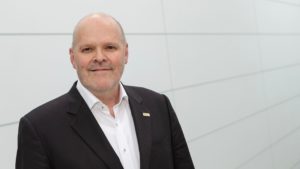Congratulations to Dr. Yves Desjardins and our partners at INAF
December 1, 2019
 In October of this year, Dr. Yves Desjardins accepted the Outstanding Scientific Contribution Award at an international conference behind the success of research into the role of polyphenols in the prevention of cognitive impairment and how the modulation of the gut microbiome relates to inflammation and aging.
In October of this year, Dr. Yves Desjardins accepted the Outstanding Scientific Contribution Award at an international conference behind the success of research into the role of polyphenols in the prevention of cognitive impairment and how the modulation of the gut microbiome relates to inflammation and aging.
Dr. Desjardins is a researcher at Laval University’s Institute of Nutrition and Functional Foods (INAF), NPC’s node partner in Quebec. He is a valued observer on NPC’s Board of Directors. We spoke with him about the research that led to this award, and the value of collaboration and partnerships to advance science into real-world solutions.
NPC: Congratulations on receiving the conference’s Outstanding Scientific Contribution Award.
YD: It was unexpected. I’m humbled because what I do is team work that I couldn’t have done without my colleagues from France and INAF.
NPC: Tell us about your research.

Dr. Yves Desjardins is a researcher at Laval University’s Institute of Nutrition and Functional Foods (INAF), NPC’s node partner in Quebec. INAF is dedicated to the study of foods and the interactions between food components, nutrition and health.
YD: The idea was to demonstrate that a polyphenol extract made from blueberries and grape seed could improve memory in the elderly. We started by publishing a number of papers showing the extract could improve neurogenesis in mice. Later, we held a large human clinical trial with 200 participants without cognitive impairments. These were people between 60 and 70 years from France and Quebec, healthy, and with good memories at the beginning of the trial.
Among the four groups there was a subgroup of participants that we identified with slight memory impairments as evaluated by CANTAB, the standardized battery of cognitive tests. They were 65 years of age on average, but had a cognitive age of almost 76 or 77 years. After they’d been taking the supplement for six months their memory ability was brought back to their physical age!
NPC: You mean some participants saw results just by taking the supplement?
YD: Yes. We didn’t want participants to change any of their other habits, just to take the extract supplement.
Last week, we were very happy that our research was cited in the front-page editorial of the American Medical Association’s journal (JAMA). JAMA took our research that showed diet is important for improving some aspects of life, such as cognition. Our research has had impact! The extract, called Cerebelle, is now being sold all over the world by Diana Food.
NPC: Why do you think your research is getting people excited?
YD: People want to have an alternative to medicine. We’re conscious about the role of diet in our livelihood. I think people are slowly shifting to a less Westernized diet, vegetarianism and veganism are both part of this. It’s a change of paradigm that you must improve your diet, not only when you’re 60-years old, but throughout your life.
NPC: What are the global benefits of your research?
YD: We’re demonstrating and documenting the common wisdom that fruits and vegetables are beneficial to health. We’re showing this using a state-of-the-art approach that is a placebo control, double-blind clinical study, providing unbiased knowledge to confirm our beliefs.
NPC: What’s next?
YD: Right now, we have a mechanism. It’s a supplement made from blueberries and grape seed for improving neurogenesis in the elderly, for improving cognition. The thing we don’t know is which molecule is involved and we’re trying to find this out. So, things are getting more complicated, because we want to understand what brought about this improvement. We need to work with gastroenterologists, microbiologists, chemists, and we’re merging many different disciplines to understand what’s happening. That’s what I’m doing at this very moment.
NPC: What can other companies learn from your experience?
YD: Well to start, make an investment in research. If you want to sell a health product to a consumer you have to have solid data supporting you. Since some companies are too small to invest in clinical studies, it may be possible to create a consortium with other companies to help fund such expensive studies.
In order to do these advancements, it’s important to be in the proper environment. And you need to have a critical mass. That’s what we have at INAF, a critical mass of 90 researchers working on different aspects of diet and health. Without this environment I wouldn’t be able to work in my little lab by myself. I’m benefiting from them.
 Back
Back